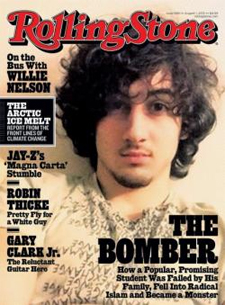We've come a long way since 1970, the year in which Rolling Stone selected mass murderer Charlie Manson as a cover boy. People picked up the issue because they wanted to know what made that cult leader and madman tick.
 Some objected to Jan Wenner's editorial judgment, but their cries paled in comparison to the fury unleashed at the magazine's decision to put suspected Boston Marathon bomber Dzhokhar Tsarnaev on the cover that hits the newsstands tomorrow.
Some objected to Jan Wenner's editorial judgment, but their cries paled in comparison to the fury unleashed at the magazine's decision to put suspected Boston Marathon bomber Dzhokhar Tsarnaev on the cover that hits the newsstands tomorrow.
What happened to our society? Where is the curiosity or thirst for knowledge? Why are so many unwilling to escape their comfort zone?
Social media, of course, is the difference between now and 43 years ago. Twitter and Facebook, especially in supposed cultural capital New England, are ablaze with threats of boycott due to the magazine’s alleged "glorification of terrorism." How many of those hotheads actually read Janet Reitman’s piece called "The Bomber: How a popular, promising student was failed by his family, fell into radical Islam and became a monster." That's hardly a call to rally around the flag of terrorism.
Boston mayor Tom Menino, who should know better, wrote a letter to Wenner to complain that the Reitman piece "reaffirms a terrible message that destruction gains fame for killers and their causes."
Anti-First Amendment chains like Walgreens, CVS Pharmacy and Tedeschi Food Shops have promised not to carry the magazine that apparently could upset the delicate sensitivities of their shoppers. That's their decision and loss. When did they get into the censorship business? What do freedom of the press advocates do? Retaliate? Boycott frozen veggies at Tedeschi's? Ridiculous!
Many of Rolling Stone's biggest critics demand that the magazine stick to music. They fail to understand (or ignore) the simple fact that Rolling Stone's insightful coverage of the political and cultural scene is why it has survived for as long as it has. (Just ask General McChrystal.)
Editors of Rolling Stone posted the following yesterday:
“Our hearts go out to the victims of the Boston Marathon bombing, and our thoughts are always with them and their families. The cover story we are publishing this week falls within the traditions of journalism and Rolling Stone's long-standing commitment to serious and thoughtful coverage of the most important political and cultural issues of our day. The fact that Dzhokhar Tsarnaev is young, and in the same age group as many of our readers, makes it all the more important for us to examine the complexities of this issue and gain a more complete understanding of how a tragedy like this happens."
When it comes down to it, Rolling Stone is in business to make money. The anti-Tsarnaev coverage buzz is bound to boost sales. The prison cell interview issue with Manson ranks among Rolling Stone's biggest sellers. Big newsstand sales are expected for The Bomber issue.
The Manson issue also earned a National Magazine award. We'll see how many awards Rolling Stone will pick up this time around.
Dr. Hook and the Medicine Show used to sing about how they would have the big time, if they could only get their mugs on the “cover of the Rolling Stone.” Fame and fortune would follow.
Tsarnaev can’t expect the same career boost. He faces 30 federal charges, including using a weapon of mass destruction to kill people. Prosecutors could pursue the death penalty.
Good job, Rolling Stone.


 Trump Media & Technology Group today reported a $58.2M net loss on $4.1M in 2023 revenues, a disclosure that drove its stock price down 22.6 percent to $47.96.
Trump Media & Technology Group today reported a $58.2M net loss on $4.1M in 2023 revenues, a disclosure that drove its stock price down 22.6 percent to $47.96. Barry Pollack, an attorney at Wall Street’s Harris St. Laurent & Wechsler, has registered Julian Assange as a client with the Justice Dept. “out of an abundance of caution.”
Barry Pollack, an attorney at Wall Street’s Harris St. Laurent & Wechsler, has registered Julian Assange as a client with the Justice Dept. “out of an abundance of caution.” Paramount Global to slash 800 jobs in what chief executive Bob Bakish calls part of an effort to “return the company to earnings growth"... Rolling Stone editor-in-chief Noah Shachtman is exiting at the end of the month due to disagreements with chief executive Gus Wenner over the direction the magazine is taking... The New York Times broke the $1 billion barrier in annual revenue from digital subscriptions in 2023... Press Forward is investing more than $500 million to strengthen local newsrooms.
Paramount Global to slash 800 jobs in what chief executive Bob Bakish calls part of an effort to “return the company to earnings growth"... Rolling Stone editor-in-chief Noah Shachtman is exiting at the end of the month due to disagreements with chief executive Gus Wenner over the direction the magazine is taking... The New York Times broke the $1 billion barrier in annual revenue from digital subscriptions in 2023... Press Forward is investing more than $500 million to strengthen local newsrooms. The majority of news articles are read within the first three days of publication, according to a recent report.
The majority of news articles are read within the first three days of publication, according to a recent report. The Los Angeles Times gives pink slips to 115 people or 20 percent of its newsroom staff... TIME is also laying off about 30 employees, which is approximately 15 percent of its editorial staff... The Baltimore Banner, which was launched by Stewart Bainum in 2022 after he failed to buy the Baltimore Sun, added 500 subscribers per day in the three days following Sinclair Broadcast Group's deal to purchase the Sun.
The Los Angeles Times gives pink slips to 115 people or 20 percent of its newsroom staff... TIME is also laying off about 30 employees, which is approximately 15 percent of its editorial staff... The Baltimore Banner, which was launched by Stewart Bainum in 2022 after he failed to buy the Baltimore Sun, added 500 subscribers per day in the three days following Sinclair Broadcast Group's deal to purchase the Sun.


 Have a comment? Send it to
Have a comment? Send it to 
No comments have been submitted for this story yet.